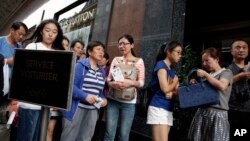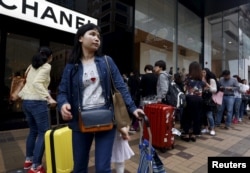China’s tourism watchdog is mulling measures to tighten regulations for discount trips following the death of a Chinese tourist in Hong Kong.
China's National Tourism Administration has already tried imposing penalties on travel agents who organize forced shopping tours, but that has done little to curb the practice. Critics say putting tourists themselves in the crosshairs is likely to be a tough policy to enforce.
In an online statement Sunday, the tourist organization said it is studying relevant punishment measures for Chinese tourists who sign what it called "fake contracts" with travel agencies for bargain trips.
The fake contracts appear to comply with government regulations for low priced trips, which ban forced buying, but in reality tourists know they are getting a huge discount with the understanding that when they reach their destination they will make big purchases. Tour guides then get a commission from the stores where the tourists shop.
Tour tragedy
The regulator’s decision comes after 54-year-old mainland tourist Miao Chunqi was allegedly beaten up outside a jewelry store and died of a heart attack early last week in Hong Kong.
Miao was trying to mediate an argument between two of his fellow tour members and their tour guides after they refused to shop.
The 20-member tour group had been arranged by a Shenzhen-based travel agency.
Each of the tourists on the tour reportedly paid 300 yuan (US$47) for a three-day tour and shopping marathon in Hong Kong.
“To some extent, crime has been committed in two areas. The first is that those people who [have] sold discount trips below the cost, that is in China,” said Andrew Chan, an associate professor at the Hong Kong Polytechnic University's school of hotel and tourism management.
“The other behavior that can be considered crime is that people are being coerced to shop. This is where the money come from, over 60 percent of those goods sold go to the tour operators,” he added.
Banned in China
Tourism regulators in both Hong Kong and China have long had measures in place that prohibit dirt-cheap trips.
Chinese authorities have been threatening to revoke licenses or impose fines of up to 300,000 Chinese yuan (US$47,300) on travel agencies that lure tourists with unreasonably low fees that are below the cost and later forced them to shop in designated stores. But so far, the practice remains rampant even though "free" trips are banned in China.
The only area where authorities appear to be making some inroads is when tours are advertised online. In early March this year, two online travel agencies "turiu.com" and "ly.com" were ordered to cancel a promotional tour that cost participants only 1 Chinese yuan (US$0.16).
Lilien Lian, managing director of Grand China Air Travel said that even if authorities approve the new regulations that target tourists, they will be hard to enforce.
“China is such a big country. [It’s hard already for] orders [from Beijing] to be followed through in local provincial governments or governments of third- or fourth-tier cities. Their execution just isn't thorough,” she said.
It takes huge efforts and manpower to monitor such illegal practices and in places where there is no supervision, tour operators struggling with thin margins will still tend to take risks, she added.
Bans Unnecessary
However, Lily Zeng of Jiangxi Normal University’s school of tourism argues that, in free markets, no discount trips should be banned and shopping arrangements should be allowed as long as a prior consent from tourists is clearly stated in the contract.
“Some people pay for service with their time while others pay for [high-end] service with their deep pockets,” Zeng said in an emailed reply. “Hence, It’s not fair to say discount trips are unreasonable.”
Zeng agrees that tourists should be held liable if they fail to spend a pre-agreed amount of time at shops as stated in the contract and itinerary. But a clear line should be drawn when tourists are locked up and forced to buy, which should definitely be considered a crime, she added.
Joseph Tung, executive director of the Travel Industry Council of Hong Kong, also welcomed the Chinese regulator’s move.
“We hope that outbound tourists in mainland China can be more healthy, in terms of more protection for the consumers,” said Tung, whose council is authorized by the government to discipline the territory’s tour operators. “But at the same time, I think the consumers, they would have to understand that there are certain areas, they have to also look after their own interests.”
Hong Kong Polytechnic University’s Chan disagreed. He said that if punishments are imposed on tourists, it is likely to backfire.
“Even though they are beaten up by those salespeople in Hong Kong, they will not complain, because they understand, if they complain, and then [when] they go back to China, they will be criminalized. So, I don’t think this is reasonable and fair at all,” Chan said.

